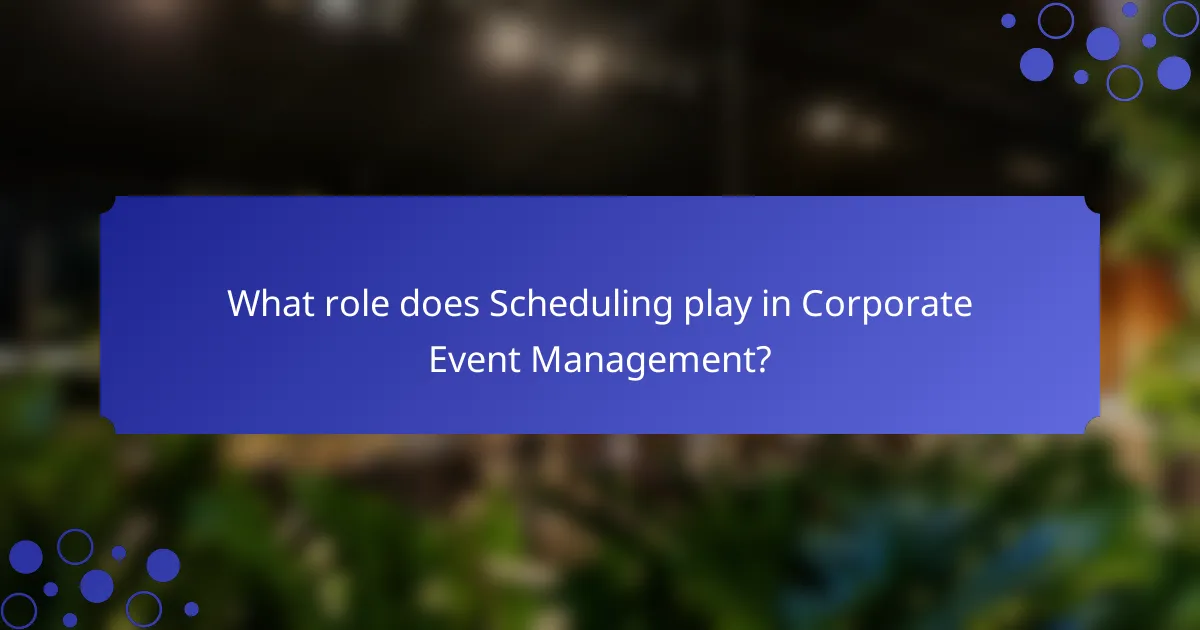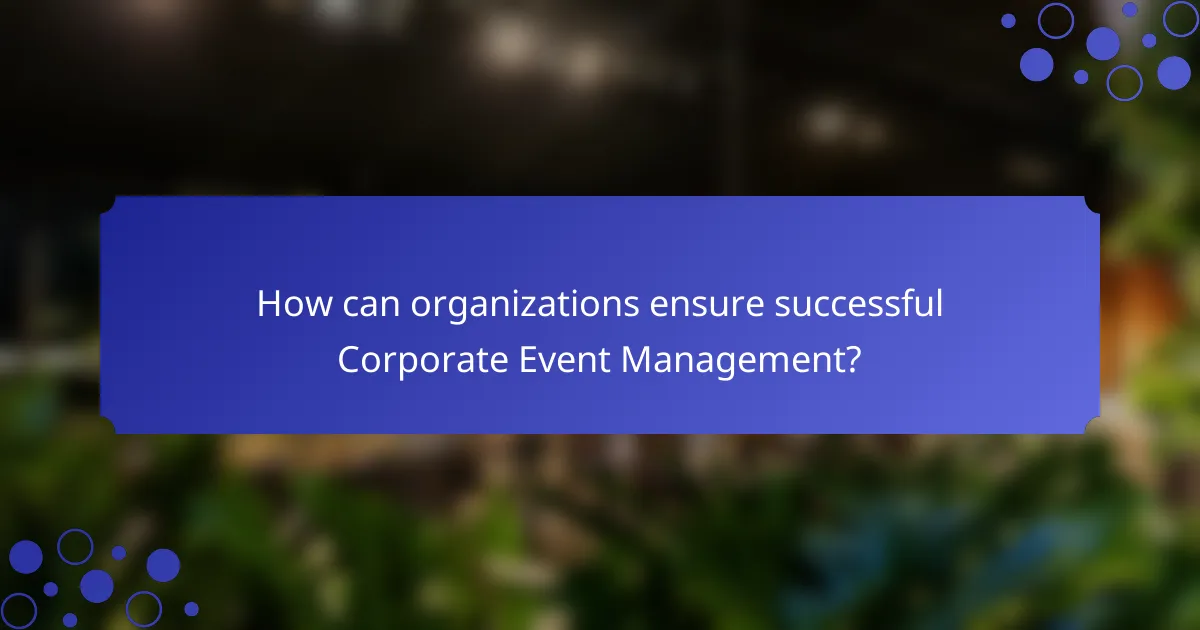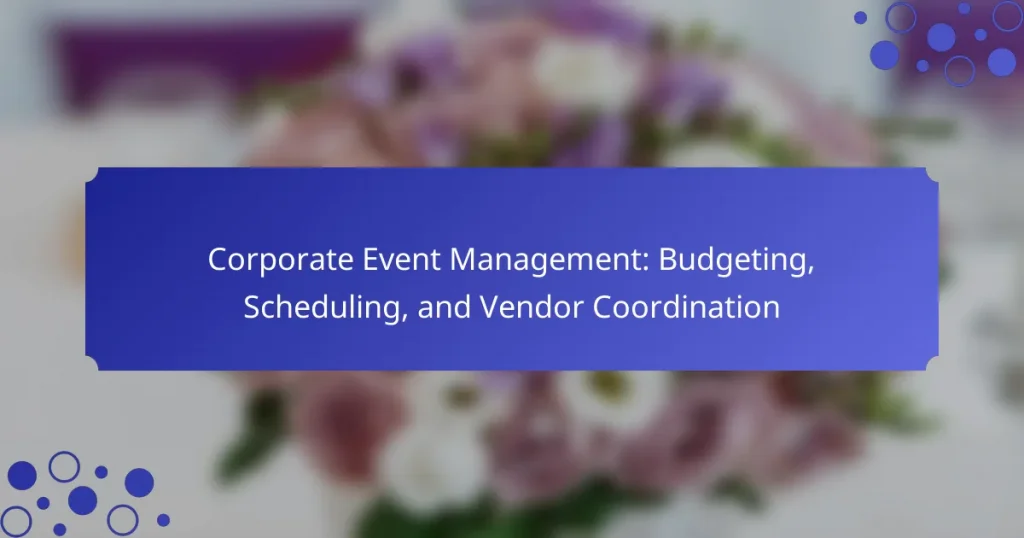Corporate event management encompasses the planning and execution of corporate events, including conferences, meetings, and product launches. Key components of this process involve budgeting, scheduling, and vendor coordination, all aimed at meeting specific objectives and engaging attendees. Effective scheduling is crucial for timely task execution, resource allocation, and minimizing conflicts. Organizations can enhance their event success by implementing thorough planning, defining clear objectives, and utilizing event management software to streamline processes. Strong communication with vendors and regular follow-ups are essential for ensuring seamless execution and achieving desired outcomes.

What is Corporate Event Management?
Corporate event management is the process of planning and executing corporate events. This includes conferences, meetings, and product launches. It involves budgeting, scheduling, and coordinating with vendors. Effective corporate event management ensures that objectives are met and attendees are engaged. According to a report by Event Marketer, 79% of marketers say live events are critical to their company’s success. Proper management can enhance brand visibility and foster networking opportunities.
How does Corporate Event Management function in organizations?
Corporate Event Management functions by coordinating various aspects of events within organizations. It involves planning, executing, and overseeing events to achieve specific goals. Key components include budgeting, scheduling, and vendor coordination. Budgeting ensures that financial resources are allocated effectively. Scheduling involves setting timelines for tasks and event activities. Vendor coordination includes selecting and managing suppliers for services like catering and audiovisual support. Effective Corporate Event Management enhances organizational branding and employee engagement. According to a study by the Event Marketing Institute, 84% of organizations find that events positively impact their brand awareness.
What are the key phases in Corporate Event Management?
The key phases in Corporate Event Management include planning, execution, and evaluation. Planning involves defining objectives, setting a budget, and creating a timeline. Execution focuses on coordinating logistics, managing vendors, and ensuring all elements align with the plan. Evaluation assesses the event’s success through feedback and performance metrics. Each phase is crucial for achieving a successful corporate event.
How do various stakeholders contribute to Corporate Event Management?
Various stakeholders contribute to Corporate Event Management by providing essential resources and expertise. Event planners coordinate logistics and timelines. They ensure that all elements align with the event’s goals. Vendors supply necessary services like catering, audiovisual equipment, and decorations. Their reliability impacts the event’s overall success. Sponsors provide financial support and brand visibility. Their involvement enhances the event’s reach and credibility. Attendees offer feedback and engagement, shaping future event strategies. Each stakeholder’s role is crucial for seamless execution and achieving desired outcomes.
Why is Budgeting critical in Corporate Event Management?
Budgeting is critical in Corporate Event Management because it ensures that resources are allocated efficiently. A well-defined budget helps in planning for all aspects of the event, including venue, catering, and entertainment. It prevents overspending and allows for financial control throughout the planning process. Accurate budgeting facilitates better decision-making regarding vendor selection and service quality. According to a survey by Eventbrite, 68% of event planners cite budgeting as a primary concern. This highlights its importance in achieving successful outcomes while meeting financial constraints.
What are the essential components of a Corporate Event budget?
The essential components of a Corporate Event budget include venue costs, catering expenses, and audiovisual equipment rental. Venue costs typically encompass rental fees, security deposits, and insurance. Catering expenses cover food and beverage services, including staff gratuities. Audiovisual equipment rental includes costs for sound systems, projectors, and lighting. Additional components are marketing and promotional materials, transportation, and accommodation for guests. Event staffing costs, such as event planners and support staff, also contribute to the budget. Lastly, contingency funds are essential for unexpected expenses. Each component plays a vital role in ensuring the event’s success and financial viability.
How can organizations effectively allocate funds for Corporate Events?
Organizations can effectively allocate funds for corporate events by creating a detailed budget plan. This plan should include all potential expenses such as venue costs, catering, and entertainment. Prioritizing these expenses based on the event’s goals is crucial. For example, if networking is a priority, investing in a quality venue may take precedence.
Organizations should also gather quotes from multiple vendors to ensure competitive pricing. Tracking past event expenses can provide valuable insights for future budgeting. Additionally, setting aside a contingency fund for unexpected costs is advisable.
According to a study by Eventbrite, 80% of event planners recommend budgeting for at least 10% of the total costs for unforeseen expenses. This practice helps organizations manage funds more effectively and ensures a successful event.

What role does Scheduling play in Corporate Event Management?
Scheduling is essential in corporate event management as it ensures timely execution of tasks. It involves setting dates and timelines for event activities. Effective scheduling helps in resource allocation and vendor coordination. It minimizes conflicts and overlaps in event planning. Proper scheduling allows for contingency planning and adjustments. According to a survey by Eventbrite, 70% of event planners cite scheduling as a critical factor for success. This highlights its importance in achieving event objectives.
How can effective Scheduling enhance Corporate Events?
Effective scheduling enhances corporate events by ensuring timely execution of all activities. It allows for optimal resource allocation, reducing conflicts and maximizing attendance. Scheduled timelines help maintain focus on key objectives and deliverables. This organized approach minimizes stress for event planners and participants alike. According to a study by Eventbrite, 70% of event planners believe that precise scheduling is crucial for event success. Additionally, clear schedules facilitate better communication among vendors and stakeholders. This leads to improved collaboration and fewer misunderstandings. Overall, effective scheduling is essential for a seamless corporate event experience.
What tools are available for Scheduling Corporate Events?
Tools available for scheduling corporate events include event management software, calendar applications, and project management tools. Event management software like Cvent and Eventbrite offers comprehensive features for scheduling, registration, and attendee management. Calendar applications such as Google Calendar and Microsoft Outlook allow for easy scheduling and sharing of events. Project management tools like Asana and Trello help in tracking tasks and timelines related to the event. These tools enhance organization and communication, ensuring successful event execution.
How do timelines impact the success of Corporate Events?
Timelines significantly impact the success of corporate events by ensuring proper planning and execution. A well-defined timeline allows for organized scheduling of tasks and responsibilities. This organization minimizes the risk of oversights and last-minute issues. Timelines help in allocating resources efficiently, including budget and staff. They also facilitate timely communication with vendors and stakeholders. Research shows that events with clear timelines are 30% more likely to meet their objectives. Effective timelines contribute to a smoother event flow and enhance attendee experience.
What are the best practices for Vendor Coordination in Corporate Event Management?
Effective vendor coordination in corporate event management involves clear communication, detailed contracts, and timely follow-ups. Establishing a single point of contact for each vendor streamlines communication. Regular meetings ensure alignment on expectations and responsibilities. Creating a comprehensive timeline helps track deadlines and deliverables. Documenting all agreements in contracts protects both parties’ interests. Utilizing technology for project management can enhance coordination efficiency. Providing vendors with detailed event information fosters better service. Finally, conducting post-event evaluations helps improve future vendor relationships and coordination efforts.
How do you select the right vendors for Corporate Events?
To select the right vendors for corporate events, first define your event’s specific needs. Identify the type of event, budget, and desired outcomes. Research potential vendors by checking their experience and reputation in similar events. Evaluate their portfolio and client testimonials for quality assurance. Request detailed quotes and compare services offered. Assess their responsiveness and communication skills during the inquiry process. Confirm their reliability by checking references or previous client feedback. Consider any unique attributes they may offer, such as specialized services or innovative solutions. This systematic approach ensures alignment between vendor capabilities and event requirements.
What strategies can improve communication with vendors?
Establishing clear communication protocols can significantly improve communication with vendors. Regularly scheduled check-ins keep all parties informed. Utilizing project management tools enhances transparency and accountability. Providing detailed briefs ensures vendors understand expectations. Encouraging feedback fosters a collaborative environment. Offering multiple communication channels caters to vendor preferences. Documenting all communications helps in tracking progress and resolving misunderstandings. These strategies lead to smoother interactions and successful partnerships.

How can organizations ensure successful Corporate Event Management?
Organizations can ensure successful Corporate Event Management by implementing thorough planning and coordination. They should define clear objectives for the event. This includes understanding the target audience and desired outcomes. Budgeting accurately is crucial, as it helps in allocating resources effectively. Scheduling must be done meticulously to avoid conflicts and ensure availability of venues and services. Vendor coordination is essential for seamless execution. Organizations should establish strong communication with all vendors involved. Regular follow-ups can prevent misunderstandings and ensure timelines are met. Utilizing event management software can streamline processes and enhance efficiency. These strategies collectively contribute to a successful corporate event.
What common challenges do organizations face in Corporate Event Management?
Organizations face several common challenges in Corporate Event Management. Budget constraints often limit the scope and quality of events. Scheduling conflicts can arise, making it difficult to secure venues and speakers. Coordination with multiple vendors adds complexity to the planning process. Communication breakdowns may lead to misunderstandings or missed deadlines. Additionally, measuring the success of events can be challenging without clear metrics. Lastly, adapting to unexpected changes, such as cancellations or weather issues, requires flexibility and quick decision-making. These challenges are frequently reported in industry surveys and case studies, highlighting their prevalence in event management.
How can organizations troubleshoot issues in Corporate Event planning?
Organizations can troubleshoot issues in corporate event planning by conducting thorough pre-event assessments. Identifying potential risks and challenges early is crucial. Regular communication among team members helps to address concerns promptly. Utilizing project management tools can streamline processes and improve coordination. Feedback from previous events provides valuable insights for improvement. Establishing a contingency plan ensures readiness for unexpected situations. Engaging with reliable vendors enhances overall event execution. Monitoring event progress in real-time allows for immediate adjustments as needed.
What are the top tips for effective Corporate Event Management?
Effective corporate event management requires meticulous planning and organization. Start by defining clear objectives for the event. This ensures all efforts align with desired outcomes. Next, establish a realistic budget. According to industry standards, 30% of the budget should be allocated to venue costs. Create a detailed timeline to track important milestones. Research shows that events with strict timelines are 25% more likely to stay on budget.
Engage reliable vendors early in the planning process. Building strong relationships with vendors can lead to better service and pricing. Regular communication with all stakeholders is crucial. This helps to avoid misunderstandings and ensures everyone is on the same page. Finally, conduct a thorough post-event evaluation. This allows for identifying successes and areas for improvement, enhancing future events.
How can organizations measure the success of their Corporate Events?
Organizations can measure the success of their corporate events through various metrics. Key performance indicators (KPIs) include attendee satisfaction, which can be assessed via post-event surveys. Engagement levels during the event can also be tracked through participation rates in activities and sessions. Financial metrics such as return on investment (ROI) are critical. This involves comparing the event costs to the revenue generated or leads acquired. Social media engagement provides insight into the event’s reach and impact. Additionally, analyzing the number of follow-up meetings scheduled post-event can indicate success in networking. These metrics collectively provide a comprehensive view of an event’s effectiveness.
What lessons can be learned from past Corporate Events?
Past corporate events teach valuable lessons about planning and execution. Effective budgeting is crucial for success. Overspending can lead to financial strain. Clear scheduling prevents conflicts and ensures attendance. Vendor coordination is essential for smooth operations. Poor communication can result in logistical issues. Feedback from attendees helps improve future events. Learning from past mistakes enhances overall event quality. Historical examples show that well-planned events yield higher satisfaction rates.
Corporate Event Management encompasses the planning and execution of corporate events such as conferences, meetings, and product launches, focusing on budgeting, scheduling, and vendor coordination. The article outlines the critical phases of corporate event management, emphasizing the importance of effective budgeting and scheduling to achieve organizational goals while enhancing brand visibility and attendee engagement. It also discusses the roles of various stakeholders, best practices for vendor coordination, and strategies for measuring event success. Key challenges and lessons learned from past events are highlighted to provide a comprehensive understanding of effective corporate event management.


